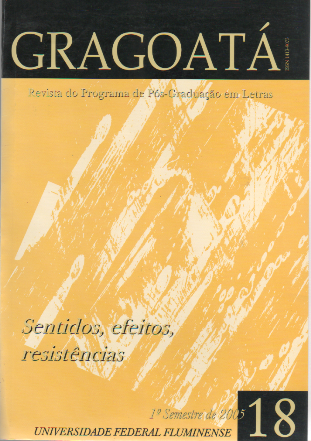Como dar razão a Jean Genet. Jacques Derrida leitor do texto literário
Palavras-chave:
Jacques Derrida, Jean Genet, crítica literária, desconstrução, mimesisResumo
O trabalho analisa os gestos metodológicos da leitura que Jacques Derrida faz da obra de Jean Genet, em Glas (1974). Destacando as repressões e resistências da crítica francesa tradicional em relação à obra de Genet, Derrida sugere que a problemática surgida com a leitura do autor esclarece impasses que são os da própria Teoria da Literatura. Como tratar de um objeto que se define por meio da "traição" à idéia de literatura, do abuso da crença na literatura? Como "dar razão" a Jean Genet, sem traí-lo e sem trair-se? Para Derrida, não se trata de submeter nem de mimetizar o literário, mas de responder a seu "acontecimento", à cena contrariante de seu descompasso com a origem. Por isso, a análise da retórica de Glas é uma contrapartida necessária para se compreender a leitura derridiana da obra de Genet e de aspectos específicos da Teoria da Literatura (relação com a mimesis, relação com o corpo).Downloads
Downloads
Publicado
Edição
Seção
Licença
AUTORIZAÇÃO
Autores que publicam em Gragoatá concordam com os seguintes termos:
Os autores mantêm os direitos e cedem à revista o direito à primeira publicação, simultaneamente submetido a uma licença Creative Commons Atribuição 4.0 Internacional (CC BY 4.0), que permite o compartilhamento por terceiros com a devida menção ao autor e à primeira publicação pela Gragoatá.
Os autores podem entrar em acordos contratuais adicionais e separados para a distribuição não exclusiva da versão publicada da obra (por exemplo, postá-la em um repositório institucional ou publicá-la em um livro), com o reconhecimento de sua publicação inicial na Gragoatá.
A Gragoatá utiliza uma Licença Creative Commons - Atribuição CC BY 4.0 Internacional.











